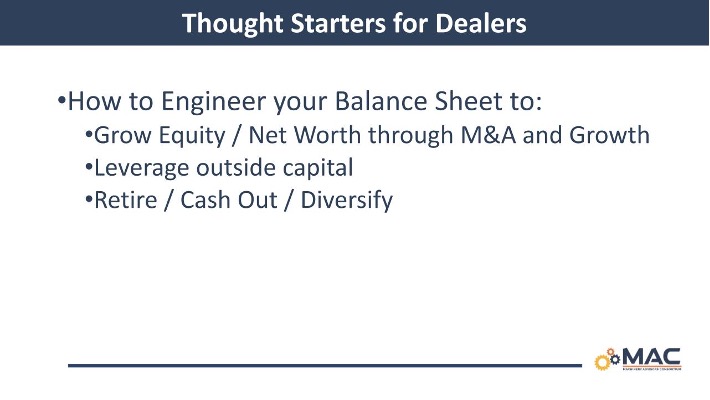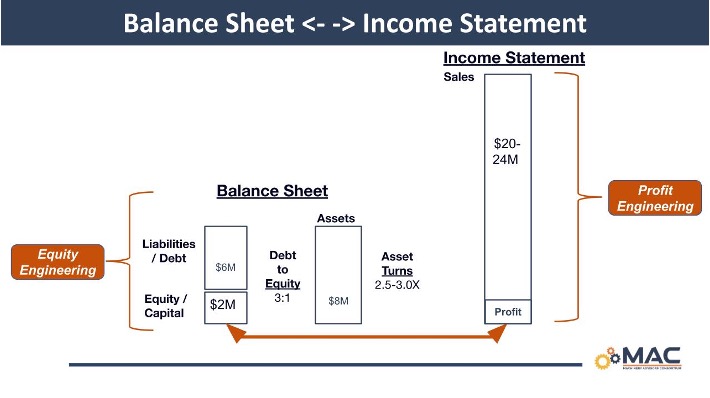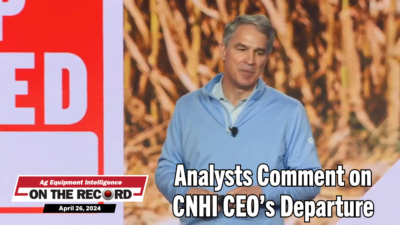Ag equipment dealers are finding ways to grow their businesses with opportunities for investment in the face of a rapidly changing landscape. Consolidation is a growing trend, not just in the ag equipment market, but in the general economy. Generational change is also a growing trend, particularly among producers and farm equipment dealers.
During a Feb. 28 Farm Equipment webinar in conjunction with Franchise Equity Partners, George Russell, a founding member of the Machinery Advisors Consortium (MAC), shared some options dealers have when it comes to private equity investment and how those options tie into what he calls the “second machine age dealer.”
According to Russell, the virtues of the second machine age dealer are the foundation of sustainability and success. These virtues are:
- Connected
- Collaborative
- Adaptive
In conjunction with consolidation and these virtues, businesses continually look for opportunities to grow. Russell echoed the need for individual businesses in the industry to build more equity. He said the 3 ways dealers are building equity are family investors (Generational), traditional private equity (3-5 years), and bank loans.

The second phase of consolidation involves big dealers buying or absorbing other big dealers. This also includes synergy across multiple industries and regions. Russell said growth options for equipment dealerships are both internal and external in terms of growth capital and growth through mergers.
Private Equity Options
Mike Esposito, co-founder and managing partner of Franchise Equity Partners (FEP) and formerly of Goldman Sachs, spoke with Jim Henderson on the webinar to expand on how investment firms are doing business and building partnerships with equipment businesses. Henderson works with MAC in strategic growth with a specific focus on profit and equity. Esposito’s investment firm, FEP, focuses on 5 verticals: heavy equipment dealers, auto dealers, restaurant franchisees, beverage distribution and a miscellaneous group of health beauty and fitness.
FEP has not formally invested in the agriculture equipment business. However, they are keen on such investments because of factors such as excellent cash-on-cash returns and the fact that most dealerships are family owned and associated with iconic brands.
As mentioned, ag equipment is representative of the growing trend in consolidation, which makes it prime for investors’ insertion and ability to build relationships with farm equipment dealers.

Above is an example Russell shared that dealers can use to assume and project the risk and capital they can take on. The equity engineered should be equal to the profit from sales, Russell says.
There are various ways for these businesses to accumulate capital, the easiest and simplest being the assumption of debt. However, because many family-owned businesses are risk-averse, “There needs to be more of a turn toward equity capital,” Esposito said.
So what exactly is an investment firm such as FEP looking for in a company to invest in?
There are 3 buckets FEP uses when evaluating an investment target. These include consolidation, cleaning up disinterested shareholders and taking more money off the table in order to diversify assets. According to Esposito, consolidation leads to better vendor contracts as well as original equipment managers. However, this all needs to be financed with equity capital, he says.
When cashing out minority shareholders, Esposito says the specific targets lean toward shareholders who have been involved for multiple generations and don’t involve themselves as closely with the business aside from collecting their share.
In diversifying a dealership’s wealth, it helps the money breathe and find other investments for the business because there is such a massive concentration of wealth among the family businesses. A large number of these companies are focusing on private equity, which will give them an opportunity to diversify their holdings, Esposito says.
Finding a partner you like is an important part of the process because in a business about relationships, people are the top priority. FEPs role is complementary to the businesses that they are investing in, including farm equipment dealerships, says Esposito.
The FEP team suggests what that target might look like based on how they see the flow opportunities for the business. Working with the principles of their investment is of the utmost importance in making decisions. There are many questions in the process of working with the firm’s investment, including:
- How to value them? (Investment)
- What future operating cash flows will look like?
- Help finance the transaction.
- The firms expertise can drive best terms with banks.
Getting through the initial investment process between the business and FEP takes as long as 6 weeks. Realistically, however it takes many more conversations than that, according to Esposito. This is a long-term investment for FEP, and ideally they would like to invest as low as $15 million with the opportunity to invest more over time. For smaller businesses looking for anywhere between $5-10 million or less, a local investment angel is likely the best option to fulfill your needs and is recommended by Esposito for those with access.
To learn more, watch the full replay of the webinar here.






Post a comment
Report Abusive Comment